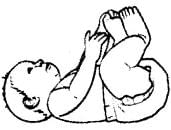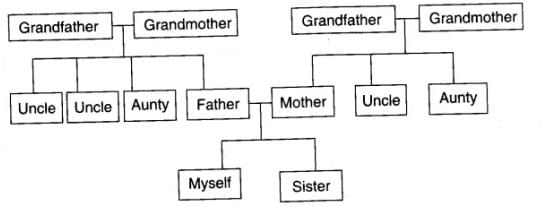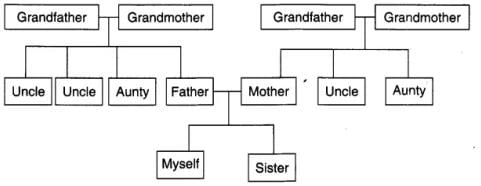NCERT Solutions for Class 4 EVS Chapter 9 - Changing Families
Page No 67
Ques 1: Who were the members of Nimmi’s family before the arrival of her baby sister?
Ans: There were five members in Nimmi’s family before the arrival of her baby sister. They were Nimmi, her mother, her father, her grandmother and her uncle.
Ques 2: How many members are there in Nimmi’s family now?
Ans: There are six members in Nimmi’s family now.
Ques 3: How do you think the lives of Nimmi’s family members have changed after the arrival of the new baby? For example –
1. How will Nimmi spend her day now?
2.What new work will her mother do now?
3.There will be a change in the daily work of Nimmi’s father, grandmother and uncle with the arrival of the new baby. Can you tell how?
Ans:
1. Nimmi will now spend her day by playing with her baby sister.
2. Her mother will now take care of her new baby along with Nimmi. She will feed the baby and change her clothes.
3. Nimmi’s father, grandmother and uncle will now give extra time to the newly born baby.
Page No 68
Ques 1: Has a small brother or sister been born in your home or in any house in your neighbourhood?
1. How does it feel to have a new baby at home?
2. How have things changed at home with the new baby?
Ans:Yes a small baby was born in my neighbourhood
1. All are very happy.
2. Everyone has become very happy in the family. Everyone has started planning about the new member. Some of the work which the mother did before, has to be done by other members.
Disclaimer: The purpose of this section is to encourage the students to interact with others. The answer may vary according to the students’ observations and experiences. It is highly recommended that the students prepare the answer on their own.
Ques 2: Find out all about the youngest child in your home or in the home of a relative.
Then write –
1. When was the baby born?
2. Is the baby a boy or a girl?
3. How are you related to him or her?
4. Where was the baby born?
5. Who does the baby look like?
6. What is the colour of his or her hair?
7. What is the colour of his or her eyes?
8. Does the baby have any teeth?
9. What is the baby’s length?
10. How many hours a day does the baby sleep?
11. What different sounds does the baby make?
12. Who does the baby stay with most of the time?
13. Stick a photograph of the baby or draw a picture in your notebook.
Ans:
1. It was born about two week back.
2. The newly born baby is a girl.
3. I am her neighbour.
4. The baby was born in the hospital.
5. The baby looks like her mother.
6. The colour of her hair is black.
7. She has black eyes.
8. No, she does not have any tooth.
9. Her length is about two feet.
10. She sleeps for more than fourteen hours.
11. She cries and produces various types of sounds.
12. Most of the time she stays with her mom.
13.
Page No 70
Ques 1: What will change in Tsering’s family after his father’s transfer?
For example –
• Who from Tsering’s family will live with his father at the new place? Which school will Tsering go to now? Will he have new friends?
• Has anybody in your family moved to a new place because of work?
• What do you feel about this change?
Ans: All family members were happy as Tsering’s father got promotion. Tsering was also very happy because he would have to go to a new town. But Tsering’s father, mother and grandparents were slightly anxious as they had to make all the arrangements in a new town
Disclaimer: The purpose of this section is to encourage the students to share their experiences. The answer may vary according to the students’ observations and experiences. It is highly recommended that the students prepare the answer on their own.
Ques 2: Is there anyone in your class or school who has come to your school from another place? If so, talk to him or her.
(i) Where has she or he come from?
(ii) What was his or her old school like?
(iii) What does he or she find different here?
(iv) Does he or she like the change?
Ans: Last month one of the boys in my class came from another town. ‘
(i) He came from Madhya Pradesh.
(ii) His old school was good and he had lot of friends.
(iii) He finds everything new here. New people, new friends, etc. make him feel excited.
(iv) Yes, he likes the change
Page No 71
Ques 1: Do you think there will be changes in the home from where the new bride has come? What kind of changes?
Ans: Yes, there will be changes in the home from where the new bride has come. The family members of her family will miss her a lot. They will do the work that she had been doing in her family.
Page No 72
Ques 1: Talk to your mother and aunts in the family. Ask them about where they lived before they got married.
Ans: hey lived with their parents before marriage
Disclaimer: The purpose of this section is to encourage the students to interact with others and share their experiences. The answer may vary according to the students’ observations and experiences. It is highly recommended that the students prepare the answer on their own.
Ques 2: Who were the members in their families then?
Ans: In my mother’s family, she, her father, her mother, her two brothers, one sister and one uncle lived together before her marriage.
Disclaimer: The purpose of this section is to encourage the students to interact with others and share their experiences. The answer may vary according to the students’ observations and experiences. It is highly recommended that the students prepare the answer on their own.
Ques 3: Has anybody in your family been married recently? Who?
Ans: In my mother’s family, she, her father, her mother, her two brothers, one sister and one uncle lived together before her marriage.
Disclaimer: The purpose of this section is to encourage the students to share their experiences. The answer may vary according to the students’ observations and experiences. It is highly recommended that the students prepare the answer on their own.
Ques 4: Talk to your classmates and write all about what happens during weddings in their families.
1. What kind of special food is cooked?
2. What special clothes do the bride and bridegroom wear?
3. What kinds of songs and dances are performed at weddings?
Ans: A new member came in their family. All of them enjoyed a lot on the eve of marriage.
1. Sweets, pulao, puri, five types of vegetables were cooked on the eve of marriage.
2. The bridegroom wore Shervani and pagri. The bride wore lahnga and choli with red dupatta.
3. On the eve of weddings traditional, folk and modern songs and dances are performed
Disclaimer: The purpose of this section is to encourage the students to interact with others and share their experiences. The answer may vary according to the students’ observations and experiences. It is highly recommended that the students prepare the answer on their own.
We saw changes taking place in the families of Nimmi, Tsering and Nazli because of different reasons.
Ques 5: In Nimmi’s family – ______________________________________________
Ans: The reason for the change in Nimmy’s family was the birth of her baby sister.
Ques 6: In Tsering’s family – ________________________________________________
Ans: The reason for the change in Tsering’s family was the transfer of his father to a new city.
Page No 73
Ques 1: In Nazli’s family – _________________________________________________
Ans:
The reason for the change in Nazli’s family was the marriage of her elder cousin brother.
Ques 2: There can be many reasons for changes in families. Can you think of some more reasons?
Ans: Changes can occur because of the following reasons:
- Transfer of a relative who might come to live with the family
- Leaving of a family member for higher education
- Death of a family member
Disclaimer: The purpose of this section is to encourage the students to share their thoughts. The answer may vary according to the students’ observations and experiences. It is highly recommended that the students prepare the answer on their own. The answer provided here is just for reference.
Ques 3: Talk to three old people – one from your family, one from your friend’s family and one from a family in your neighbourhood. Ask them these questions and fill in the table.
| Question | Your family | Friend’s family | Neighbour’s family |
| • Since how many years has your family been staying here? | |||
| • Where did your family live before coming here? | |||
| • How many members are there in your family today? | |||
| • How many members were there in your family 10 years ago? | |||
| • What were the reasons for the changes in your family in the last 10 years? | |||
| • How do you feel about all these changes? |
Ans:
Disclaimer: The purpose of this section is to encourage the students to interact with others and share their experiences. The answer may vary according to the students’ observations and experiences. It is highly recommended that the students prepare the answer on their own. The answer provided here is just for reference.
Page 74
Ques 1: All families change in some way or the other because of different reasons. Has your family changed too?
Ans: Yes, There have been changes in my family too.
Ques 2: When your grandmother and grandfather were children like you, was your family just like it is today?
Ans: No, it was different from today. There were more family members who lived together. They used to live in a village.
Ques 3: You had also drawn a family tree of your own family? Let us again draw the family tree of last year in your notebook.
Ans:
Ques 4: Ask your grandmother or grandfather how many members were there in their family when they were your age? Then draw a family tree in your notebook of their family when they were young.
Ans:
Ques 5: Can you see yourself, your brother or your sister, your mother or your father, anywhere in this family tree?
Ans: No, I cannot see myself, my sister and my mother in this family tree.
Ques 6: Now draw a family tree of your present family in your notebook.
Ans:
Page No 75
Ques 1: Upto which class do you want to study?
Ans: I want to study upto Bachelor of Engineering degree.
Ques 2: Upto which class have your parents studied?
Ans: Both got Masters degree
Ques 3: Till which class did your grandmother get a chance to study ?
Ans: She was a graduate.
Ques 4: At what age did your grandmother get married?
Ans: She got married at the age of 20
Ques 5: Have you heard of a Law that talks about the ages before which girls and boys must not get married?
Ans: Yes. Before the age of 21, boys must not get married, and before the age of 18, girls must not get married
Disclaimer for the first four parts: The purpose of this section is to encourage the students to interact with others and share their thoughts. The answer may vary according to the students’ observations and experiences. It is highly recommended that the students prepare the answer on their own.
1. According to Prohibition of Child Marriage Act, which came into effect from 1st November, 2007, legal age for girls to get married is 18 years and boys to get married is 21 years.
2. If male adult over 18 years of age marries a girl below 18 years of age then he will be punishable.
Page No 76
Ques 1: Are there any such children in your neighbourhood who had to drop out of school? Do they want to go back to school?
Ans: There are no children in my neighbourhood who had to drop out of school. All are studying.
Ques 2: What are they doing these days?
Ans: In my neighbourhood all children are studying.
ques 3: Has anybody in your family got married recently? Who?
Ans: My uncle got married recently.
Ques 4: What was the age of the bride and the groom?
Ans: The age of the bride was 22 and the age of the groom was 25.
|
52 videos|352 docs|54 tests
|
FAQs on NCERT Solutions for Class 4 EVS Chapter 9 - Changing Families
| 1. What are the factors leading to changing family structures? |  |
| 2. How has urbanization impacted family structures? |  |
| 3. What role does globalization play in changing families? |  |
| 4. How have changing gender roles impacted family dynamics? |  |
| 5. What are some economic factors influencing changing family structures? |  |

















